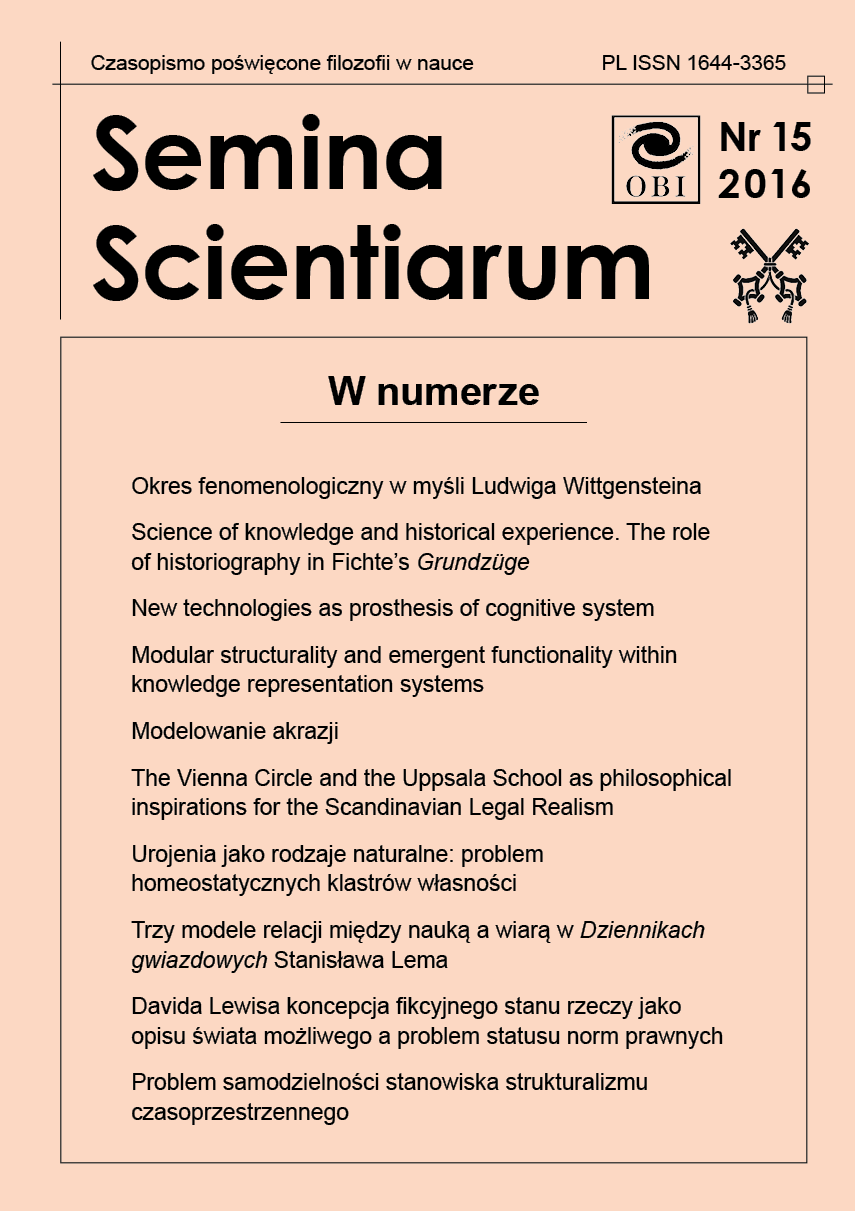Okres fenomenologiczny w myśli Ludwiga Wittgensteina
DOI:
https://doi.org/10.15633/ss.1766Słowa kluczowe:
Ludwig Wittgenstein, phenomenology, philosophical grammar, grammatical invariantsAbstrakt
Wittgenstein’s phenomenological period is a subject to a variety of interpretations which give different answers to the questions why and when did the author of the Tractatus start doing phenomenology, when and why did he stop it and what meaning had it for him. In my paper I argue for the view that Wittgenstein tried to overcome difficulties of his early philosophy by applying phenomenological investigations loosely inspired by Mach. Firstly he assumed that they may be carried out as grammatical investigations of the structure of a so‑called phenomenological language. However, finally Wittgenstein came to the conclusion that such a language is impossible. Contrary to many interpreters I believe that the rejection of phenomenological language did not put an end to the whole Wittgenstein’s phenomenology, for it persisted thereafter for a couple of years in a form of investigations of grammatical invariants of the part of our ordinary language devised to express our sensual experience.Bibliografia
Bizarro S., A Hertzian interpretation of Wittgenstein’s Tractatus, „Eidos” (2010) nr 13, s. 150–165.
Cook J. W., Wittgenstein’s metaphysics, Cambridge 1994.
Dehnel P., Ludwig Wittgenstein: teoria a terapia. Od „Traktatu” do „Dociekań filozoficznych” – studia, Warszawa 2014.
Diamond C., Peter Winch on the Tractatus and the unity of Wittgenstein’s philosophy, [w:] The philosopher and his works, ed. A. Pichler, S. Säätelä, Heusenstamm 2006, s. 133–163.
Evans G., The varieties of reference, Oxford–New York 1982.
Geach P., Mental acts. Their content and their objects, London 1971.
Gier N., Wittgenstein and phenomenology: a comparative study of the later Wittgenstein, Husserl, Heidegger and Merleau‑Ponty, Albany 1981.
Grasshoff G., Hertz’s philosophy of nature in Wittgenstein’s Tractatus, [w:] Heinrich Hertz: classical physicist, modern philosopher, ed. D. Baird, R. I. G. Hughes, A. Nordmann, Dordrecht 1998, s. 243–268.
Hintikka J., The crash of the philosophy of the Tractatus: the testimony of Wittgenstein’s Notebooks in October 1929, [w:] Interactive Wittgenstein, ed. E. De Pellegrin, Dordrecht 2011, s. 153–169.
Hintikka M., Hintikka J., Investigating Wittgenstein, Oxford 1986.
Hintikka M., Hintikka J., Wittgenstein’s annus mirabilis: 1929, [w:] J. Hintikka, Ludwig Wittgenstein: half‑truths and one‑and‑a‑half‑truths, Dordrecht 1996, s. 107–124.
Marion M., Wittgenstein, finitism, and the foundations of mathematics, Oxford–New York 1998.
Marion M., Wittgenstein and Brouwer, „Synthese” (2003) nr 137, s. 103–127.
McDowell J., Mind and world, Cambridge (MA) 1994.
Monk R., Ludwig Wittgenstein. Powinność geniusza, tłum. A. Lipszyc, Ł. Sommer, Warszawa 2003.
Monk R., The temptations of phenomenology: Wittgenstein, the synthetic a priori and the „analytic a posteriori”, „International Journal of Philosophical Studies” 22 (2014) nr 3, s. 312–340.
Park B. Ch., Phenomenological aspects of Wittgenstein’s philosophy, Dordrecht 1998.
Ramsey F. P., Cricital notice of L. Wittgenstein’s „Tractatus Logico‑Philosophicus”, [w:] F. P. Ramsey, Foundations of mathematics and other logical essays, London 1950, s. 270–286.
Rotter K., Gramatyka filozoficzna w dobie sporu o podstawy matematyki. Esej o drugiej filozofii Wittgensteina, Opole 2006.
Schlick M., Gibt es ein materiales Apriori?, [w:] M. Schlick, Gesammelte Aufsätze 1926–1936, Wien 1938, s. 19–30.
Simons P., Philosophy and logic in Central Europe from Bolzano to Tarski, Dordrecht 1992.
Spiegelberg H., The puzzle of Wittgenstein’s Phänomenologie (1929–?), [w:] H. Spiegelberg, The context of the phenomenological movement, The Hague 1981, s. 202–228.
Stern D. G., The availability of Wittgenstein’s philosophy, [w:] The Cambridge companion to Wittgenstein, ed. H. Sluga, D. G. Stern, Cambridge 1996, s. 442–476.
Visser H., Wittgenstein’s Machist sources, [w:] Ernst Mach’s Vienna 1895–1930, ed. I. Blackmore, R. Itagaki, S. Tanaka, Dordrecht 2001, s. 139–158.
Wittgenstein L., Some remarks on logical form, „Proceedings of the Aristotelian Society” 9 (1929), s. 162–171.
Wittgenstein L., Ludwig Wittgenstein and the Vienna Circle. Conversations recorded by F. Waismann, trans. J. Schulte, B. McGuinness, Oxford 1979.
Wittgenstein L., Wittgenstein’s lectures, Cambridge 1930–1932. From the notes of J. King and D. Lee, Lanham (MD) 1980.
Wittgenstein L., Philosophical occasions 1912–1952, Indianapolis 1993.
Wittgenstein L., Tractatus logico‑philosophicus, tłum. B. Wolniewicz, Warszawa 1997.
Wittgenstein L., Philosophical remarks, trans. M. A. E. Aue, Oxford 1998.
Wittgenstein L., Wittgenstein’s Nachlass. The Bergen electronic edition, Oxford 2000.
Wittgenstein L., The Big Typescript Ts 213, German–English scholars’ edition, trans. C. Grant Luckhardt, M. A. E. Aue, Oxford 2005.
Wittgenstein L., Uwagi o barwach, tłum. B. Baran, Warszawa 2014.
Pobrania
Opublikowane
Numer
Dział
Licencja
Prawa autorskie (c) 2016 Jakub Gomułka

Praca jest udostępniana na licencji Creative Commons Attribution-NonCommercial-NoDerivatives 3.0 Unported License.
Twórca oświadcza, że przysługują mu prawa autorskie do utworu i że nie są ograniczone w zakresie objętym niniejszym oświadczeniem oraz że utwór jest dziełem oryginalnym i nie narusza praw autorskich innych osób.
Twórca zezwala Uniwersytetowi Papieskiemu Jana Pawła II w Krakowie na nieodpłatne, niewyłączne i nieograniczone w czasie korzystanie z utworu, to jest:
- utrwalanie i zwielokrotnianie: wytwarzanie egzemplarzy utworu techniką drukarską, reprograficzną, zapisu magnetycznego oraz techniką cyfrową;
- obrotu oryginałem albo egzemplarzami, na których utwór utrwalono (wprowadzanie do obrotu, użyczenie lub najem oryginału albo egzemplarzy, publiczne wystawienie, wyświetlenie, a także publiczne udostępnianie utworu w taki sposób, aby każdy mógł mieć do niego dostęp w miejscu i w czasie przez siebie wybranym);
- włączenie utworu w skład utworu zbiorowego;
- udzielanie przez Uniwersytet Papieski Jana Pawła II w Krakowie sublicencji Creative Commons Uznanie autorstwa-Użycie niekomercyjne-Bez utworów zależnych 3.0 Polska
Uniwersytet Papieski Jana Pawła II w Krakowie udostępnia utwór na Platformie Czasopism należącej do uczelni, na licencji Creative Commons Uznanie autorstwa-Użycie niekomercyjne-Bez utworów zależnych 3.0 Polska. Tym samym uprawnia wszystkich zainteresowanych do korzystania z utworu pod następującymi warunkami:
- zostanie podany autor i tytuł utworu,
- zostanie podane miejsce publikacji (tytuł czasopisma i adres internetowy do oryginalnie opublikowanego utworu),
- utwór będzie dystrybuowany w sposób niekomercyjny,
- nie będą tworzone utwory zależne.

